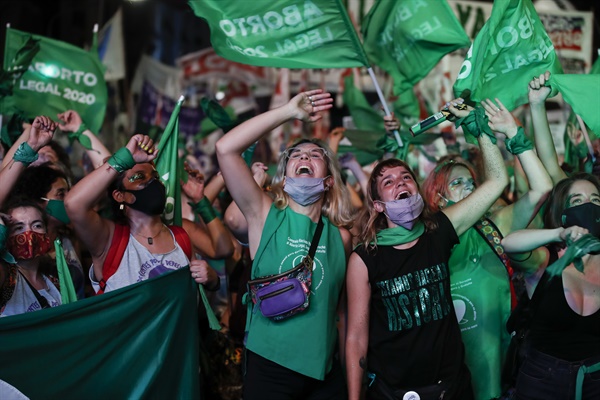 |
|
| ▲ Protesters in support of abortion legalization outside the Capitol building in Buenos Aires, Argentina’s capital city, cheered the news that the Senate passed a bill allowing abortions within 14 weeks of pregnancy. (Buenos Aires AP = Yonhap News) | |
| Ⓒ Yonhap News, AP |
View related photos |
On December 30, local time, the Argentine Senate passed the “Safe Abortion Act,” which allows abortions up to 14 weeks of pregnancy despite some Catholic opposition, with 38 in favor, 29 against, and 1 abstention. Legalizing abortion was one of the pledges of current President Alberto Fernandez.
According to South American satellite Telesur, President Alberto Fernandez wrote on his Twitter: “Safe, legal and free abortion is now legal. Today we are a better society that expands women’s rights and guarantees public health.” .
 |
|
| ▲ Argentine President Alberto Fernandez (official website) | |
| Ⓒ Capture the official website |
View related photos |
Women die every year from negative procedures
In Argentina, not only in women’s circles, but also in politics, many women die or get injured due to negative illegal abortions, so many women are admitted to hospitals. In total, more than 65 women have died from complications related to illegal abortion. However, opposition public opinion was not easy, so it had not been passed.
This was the eighth total attempt to legalize abortion so far. At the end of the eighth attempt, abortion was legalized. Of course, there is a provision that allows medical staff to refuse abortion because of their religious beliefs. It is interpreted that this has been left in order to counteract some Catholic backlash.
This legalization of abortion is an event of great historical and political significance for Argentina. To find out what it means, we need to look at Argentine history.
History of women’s liberation in Argentina: Eva Peron vs. Catholic, military
In fact, Argentina had the groundwork for abortion to be legalized in 1955. This is closely related not only to Argentina but also to Eva Peron, one of the most controversial figures in world history.
 |
|
| ▲ Eva Peron giving a speech in 1951. Although sold as a populist demon by some conservatives, he was a very important figure in the rights of women in Argentina. | |
| Ⓒ wiki commons |
View related photos |
As it is known, Eva Peron was born in a poor family and ran away, went to Buenos Aires, succeeded as a celebrity, and married Juan Peron, then Minister of Labor in 1945. And promoted a project for
At the time, Argentina was a harsh society for women. Conservatives criticized Eva Peron for coming out in his pants in public. Women’s social activities were almost blocked. In addition, the right to vote did not exist for Argentine women before the Perons took office.
Argentina gave women the right to vote in 1947. Afterwards, Eva Peron continued to promote the relief of the poor and the liberation of women through the Eva Peron Foundation. After Evita’s death, his will was taken over and divorce was legalized in 1955.
However, the legalization of divorce has provoked a backlash from the Catholic world. The Catholics were struggling with Eva Peron even when she was alive. In addition, the economy was not good, and the conflict with the military led to a coup in 1955, leaving Juan Peron in exile.
Later, in Argentina, progressive policies related to women ceased until democratization.
Legalization of abortion as a process of liquidating Catholic conservatism and military dictatorship
After democratization in the late 80s, the legalization of divorce was revived, and progressive women’s policies began to be promoted again. In the process of abolishing the abolition of military dictatorship, women’s policy was revived.
However, it seems that it was the Catholics who blocked this re-starting trend. Some Catholic conservatives were the biggest insurgents against the legalization of same-sex marriage in July 2010, and one of the biggest opposition to the legalization of abortion this time. The composition of that period when Eva Peron lived continues to this day.
Argentine conservative right-wings are also opposing the legalization of abortion with the Catholics. Argentine conservative rightists are directly or indirectly connected to the military dictatorship, like some of the South Korean water polo powers, or have turned away in the middle of the democratization movement.
Argentina’s legalization of abortion needs to be interpreted in this historical context. In other words, beyond the policy of simply promoting women’s rights, this is a process of liquidating the remains of Catholic conservatism and military dictatorship that have suppressed women’s rights.
After democratization in 1987, Korea also failed to liquidate all the remnants of military dictatorship. This is why the struggles of Argentine women and the people who support them are important to Korean society. It is necessary to watch the process by which Argentine women drive out the enemy forces and create a society where women are liberated from the Korean civil society.
[관련 기사]
Abolition of abortion crimes, the first step towards reproductive rights for women workers http://omn.kr/1qwoo
January 1, 2021 00:00 abortion death, Kwon In-sook “A great opportunity has come” http://omn.kr/1r3qb
